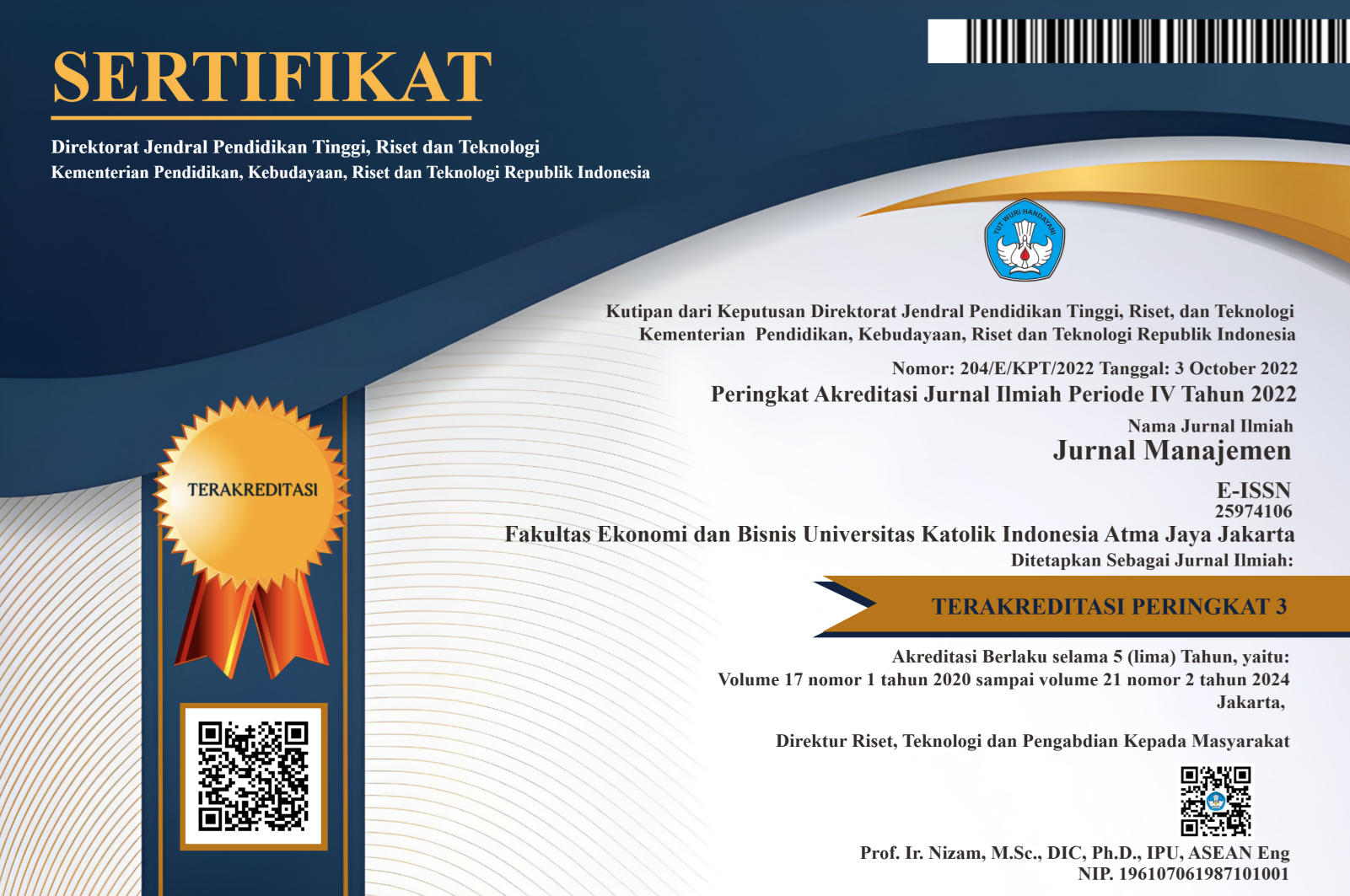Pengaruh Gender Orientation terhadap Kepuasan Karir dengan Mediasi Adaptabilitas Karir dan Psychological Capital pada Pekerja Milenial di Jakarta
DOI:
https://doi.org/10.25170/jm.v17i1.1196Keywords:
gender orientation, kepuasan karir, adaptabilitas karir, psychological capitalAbstract
Penelitian ini memiliki tujuan untuk melihat pengaruh dari gender orientation terhadap kepuasan karir yang dimediasi oleh adaptabilitas karir dan psychological capital. Model penelitian ini terdiri dari satu variabel eksogen, dua variabel mediasi, dan satu variabel endogen. Total hipotesis yang diajukan sebanyaak tujuh hipotesis. Model penelitian sudah diuji dengan tingkat normalitas, linearitas yang menunjukkan hasil berada di sig. < 0.05 sehingga dinyatakan normal dengan memiliki tingkat linearitas yang baik. Model juga diuji multikorelasionaitasnya dan menunjukkan VIF lebih kecil dari 10, sehingga menunjukkan hasil yang fit untuk diuji.
Penelitian ini dilakukan terhadap 210 responden dengan rentang usia 23-39 tahun dan sekarang merupakan karyawan perusahaan jasa yang sebelumnya sudah pernah bekerja minimal 1 tahun. Berdasarkan hasil penelitian ditemukan bahwa gender orientation, psychological capital, dan adaptabilitas karir memiliki pengaruh langsung terhadap kepuasan karir, namum adaptabilitas karir dan psychological capital tidak mampu memediasi peranan gender orientation terhadap kepuasan karir.
References
Anastasi, A., & Urbina, S. (1997). Pyschological Testing. USA: Prentice Hall.
Azwar, S. (2000). Reliabilitas dan Validitas. Yogyakarta: Pustaka Pelajar Offset
Bandura, A. (1997). Self Efficacy – The Exercise of Control (Fifth Printing, 2002). New York: W.H. Freeman & Company
Bandura, A. (1995). Self efficacy. Encyclopedia of human behavior (Vol.4, pp. 71-81). (online). New York: Academic Press. (http://www.uky.edu/~eushe2/Bandura/BanEncy.html, diakses 11 November 2018 pukul 17:32 wib).
Baron, R.M. & Kenny, D.A. 1986. The Moderator-Mediator Variable Distinction in Social Psychological Research: Conceptual, Strategic, and Statistical Considerations. Journal of personality and Social Psychology. 51 (6), 1173-1182
Coetzee,M., & Harry, N. (2015). Gender and hardiness as predictors of career adaptability: an exploratory study among Black call centre agents. South African Journal of Psychology, 45(1), 81-92
Croker, L., & Algina, J. (1986). Introduction to Classical and Modern test Theory. USA: Wadsworth.
Generasi milenial 3 kali lebih banyak pindah kerja. (2017, 22 November). Kontan.co.id. Diunduh 7 november, 2018, https://lifestyle.kontan.co.id/news/generasi-milenial-3-kali-lebih-banyak-pindah-kerja
Ghozali, I., & Fuad. (2008). Structural equation modeling: Teori, konsep & apliksi dengan program Lisrel 8.80 (Ed. 2). Semarang: Badan Penerbit Universitas Diponegoro
Ghozali, Imam. (2009). Aplikasi Analisis Multivariate Dengan program SPSS (Edisi 3). Semarang: Badan Penerbit Universitas Diponegoro
Guilford, J. P. (1979). Psychometric Methods. New York: McGraw-Hill.
IDN Researcg Institute. (2019). Indonesia Milenial Report 2019.
Kementrian Pemberdayaan Perempuan dan Perlindungan Anak dengan Badan Pusat Statistik. 2018. Profil Generasi Milenial Indonesia. Kementrian Pemberdayaan Perempuan dan Perlindungan Anak
Koran Sindo. (2018, Januari 18). Generasi Milenial dan Pudarnya Nasionalisme Pangan. Dipetik Maret 12, 2019, dari Sindonews.com: https://nasional.sindonews.com/read/1274556/18/generasimilenial-dan-pudarnya-nasionalisme-pangan-1516213536/13
Luthans, F., Avey, J. B., Avolio, B. J., Norman, S. M., & Combs, G. J. (2006). Psychological capital development: Toward a microintervention. Journal of Organizational Behavior, 27, 387–393.
Luthans, F., Luthans, K., & Luthans, B. (2004). Positive psychological capital: Going beyond human and social capital. Business Horizons, 47, 45–50.
Luthans, F., & Youssef, C. M. (2007). Emerging positive organizational behavior. Journal of Management 33, 321–349.
Luthans, F., Youssef, C. M., & Avolio, B. J. (2007). Psychological capital: Developing the human competitive edge. Oxford, UK: Oxford University Press.
Masten, S. (2001). Ordinary magic: Resilience process in development. American Psychologist, 56,3, 227-239.
Noe, Raymond A; John R. Hollenbeck; Barry Gerhart and Patrick M. Wright. (2012). Human Resource Management: Gaining a Competitive Advantage Eight Edition. McGraw-Hill. UK.
Ngo, Hang Y., Foley, Sharon., Ji, Ming S., & Loi, Raymond. (2013). Linking Gender Role Orientation to Subjective Career Success: The
Mediating Role of Psychological Capital. Journal of Career Assessment.
Porfeli, E. J., & Savickas, M. L. (2012). Career Adapt-Abilities Scale – USA Form: Psychometric properties and relation to vocational identity. Journal of Vocational Behavior, 80, 748–753.
Quick, James Campbell; Debra L. Nelson. (2009). Principles of Organizational Behaviour Realities and Challenges Sixth Edition. Cengage-Learning. South-Western.
Scheier, M. F., & Carver, C. S. (2002). The role of optimism in social network development, coping, and psychological adjustment during a life transition. Journal of Personality and Social Psychology, 82, 102–111
Seibert, S. E., Kraimer, M. L., & Crant, J. M.. (2001). What do Proactive People do? A Longitudinalmodel Linking Proactive Personality and Careersuccess. Personnel Psychology, 54,845–87.
Seligman, M. E. P., & Csikszentmihalyi, M. (2000). Positive psychology: An introduction. American Psychologist, 55, 5–14.
Siantoro, Ayu. (2018, 20 April). Revolusi Industri 4.0 : Peluang Munculnya Profesi-Profesi Baru. Katadata.co.id. Diunduh 12 November, 2018, https://katadata.co.id/analisisdata/2018/04/20/revolusi-industri-40-peluang-munculnya-profesi-profesi-baru
Snyder, C. Rick. (2000). Handbook of hope. San Diego: Academic Press.
Snyder, C., & Lopez, S. J. (2002). Handbook of positive psychology. New York: Oxford.
Stajkovic, A.D. and Luthans, F. (1998) Self-Efficacy and Work-Related Performance: A Meta-Analysis. Psychological Bulletin, 124, 240-261
Wade, C., & Travis, C. (2008). Psychology (9th ed). New Jersey: Prentice.
Wibawa, Shierine Wangsa. (2017, 24 Maret). Inilah Alasan Karyawan Milenial Doyan Pindah Kerja. Kompas.com. Diunduh 7 November, 2018, https://lifestyle.kompas.com/read/2017/03/24/190700420/inilah.alasan.karyawan.milenial.doyan.pindah.kerja
Zacher, Hannes. (2014). Career Adaptability Predicts Subjective Career Success above and beyond Personality Traits and Core Self-Evaluations. Journal of Vocational Behavior Vol. 84, Issue 1, Pages 21-30.
Downloads
Published
Issue
Section
License
Authors who publish with this journal agree to the following terms:
Authors retain copyright and grant the journal right of first publication with the work simultaneously licensed under a Creative Commons Attribution-NonCommercial-ShareAlike License that allows others to share the work with an acknowledgement of the work's authorship and initial publication in this journal.
Authors are able to enter into separate, additional contractual arrangements for the non-exclusive distribution of the journal's published version of the work (e.g., post it to an institutional repository or publish it in a book), with an acknowledgement of its initial publication in this journal.
Authors are permitted and encouraged to post their work online (e.g., in institutional repositories or on their website) prior to and during the submission process, as it can lead to productive exchanges, as well as earlier and greater citation of published work (See the Effect of Open Access).













